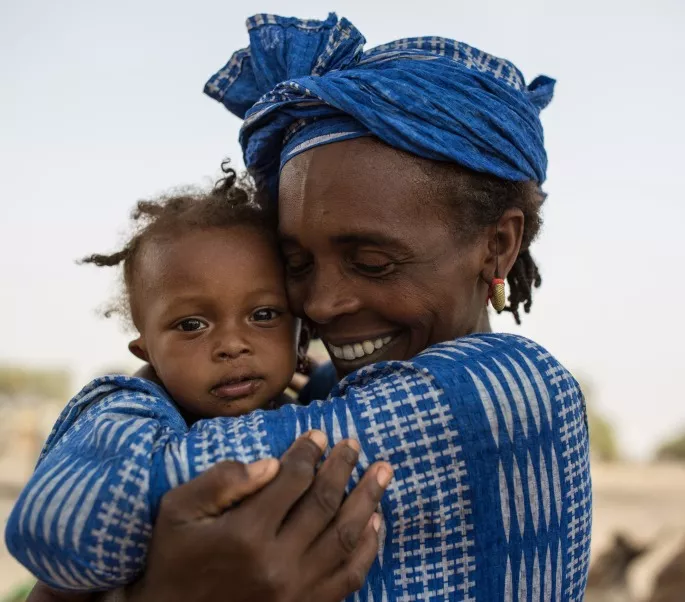Recently, this particular tweet has made an appearance on many Muslim women’s social media accounts, receiving a lot of mixed reactions. I came across it when it was first shared in a Muslim mothers’ Whatsapp group, where it became the topic of discussion for some time. From the moment I read it, I found it deeply problematic, insulting, and in many ways quite shocking that there were individuals out there who support the message in the post. On the one hand, we can take the question at face value and get caught up in trying to answer the question itself by trying to name the countless “benefits” of motherhood, to somehow justify, defend, or prove its worth. I immediately caught myself asking: WHY on earth is this a question I should feel compelled to answer? To make sure I understand correctly, as a mother, I’m being asked to prove the worth of my child’s existence as a human being?
While there are so many reasons that the underlying premise and values of this tweet and its accompanying response are flawed and problematic, Dr. Syed [in our weekly NYM Ilm Circle] summed it up best:
“Motherhood disadvantages women if you don’t believe in Allah (swt). If you believe in Allah (swt), it’s an advantage.”
He stated that a lot of individuals feel uncomfortable with the statement in this tweet but it’s hard to really pinpoint or deconstruct it to its bare bones. He went on to query, “What is the creed that this statement is based upon?” It’s based upon the notion that our value is based on Materialism, and that a human’s innate value and materialism are linked.” The tweet and accompanying comment is likely alluding to the idea that women may miss out on educational opportunities or decrease their earning potential after becoming a mother, hence the bold proclamation that “motherhood severely disadvantages women.” So yes, if your gauge is materialism, then yes it disadvantages you. Dr. Syed reminded us that for a Muslim, every human being has innate value, whether you earn money or not or whether you can bring something to the table in a “material” sense or not. This statement is an aqeedah issue. Is value given to you by “material things” or is value given to you by Allah (swt)? That’s the difference.
In Surah Luqman, Ayah 33, Allah (swt) states:
O humanity! Be mindful of your Lord, and beware of a Day when no parent will be of any benefit to their child, nor will a child be of any benefit to their parent. Surely Allah’s promise is true. So do not let the life of this world deceive you, nor let the Chief Deceiver deceive you about Allah.
Dr. Syed discusses that Allah (swt) is clearly telling us in this ayah that this world (dunya) cannot avail us, and that this life is here to deceive us. In the ilm circle, Dr. Syed further reminded us that our Prophet (saw) did not leave behind huge amounts of wealth, yet we hold our Rasul (saw) above any other human being, higher than the Bill Gates and Jeff Bezos of the world. Why? Rasul (saw) is above all of these people because wealth is not our gauge. We don’t gauge a person’s worth because of their spending or buying power. As Muslims, we understand there are basic needs of individuals that need to be met and in an Islamic society, we are responsible for ensuring that everyone has these needs met. Dr. Syed also raises the compelling point that the recent push for universal basic income is actually a centuries old Islamic concept. Omar bin Al Khattab (ra) established a basic minimum income for everyone, including mothers. So when we have these beautiful concepts of justice, and inherent rights within our religion, remind me again why “Muslim women must ask themselves this important and difficult” question about motherhood? Some of the bold proclamations in this tweet were presented as truth and fact, but Dr. Syed raised another striking and important point to consider. The truth comes from Allah (swt), so then shouldn’t we investigate what Allah (swt) says about marriage and children first? It’s important to note that it’s not fardh (obligatory) to get married or have children. As believers, we are not condemned if we don’t, as some people may not have the ability. However, if we are capable, we should, because it’s praiseworthy.
It was narrated from Aishah that: the Messenger of Allah said:
“Marriage is part of my sunnah, and whoever does not follow my sunnah has nothing to do with me. Get married, for I will boast of your great numbers before the nations. Whoever has the means, let him get married, and whoever does not, then he should fast for it will diminish his desire.”
Dr. Syed reminds us that it’s very clear that if you are a Muslim, both of these actions are praiseworthy and he reiterated that our gauge to determine what is advantageous or disadvantageous is Allah (swt) and His Messenger (saw). Unfortunately, statements like these goes to show that we’ve really put our hopes and dreams into materialistic things and that has become our determining factor for everything.
SubhanAllah, when I first came across the tweet, I remember finding it so unsettling and problematic to think of value in terms of tangible benefits and I remember thinking: Since when do we do what we do as Muslims to gain tangible benefits in this dunya? It really made me reflect on how materialism and individualism have unfortunately permeated deeply in our own Muslim societies and values.
On a personal level, as a Muslim mother of a spirited, lively, and energetic toddler-it genuinely exasperates me that someone would have the audacity to not only slap me with the label of being disadvantaged (isn’t that completely against values of women empowerment?), but to tell me that deep, innate, and indescribable feelings of love apparently aren’t legitimate responses. So then what would make it worth it? 1 million dollars compensation? 2 million dollars? What would be considered “tangible” enough? Motherhood isn’t transactional, hence, only Allah (swt) can truly reward us. Our husbands, nor our children or families will ever be able to repay us. So why even look for some kind of measly “tangible” benefit from the dunya? I’ve heard some supporters of this post claim that it’s meant to be a commentary on the lack of support that mothers receive from men or society. I’m sorry, I just don’t believe that’s what this post is truly about. Mothers absolutely deserve full respect, encouragement, honor, and support, (both physically, practically, and mentally) from our communities. These are all things that are actually built into our deen already, and unfortunately are not always implemented properly by Muslims today. In this case, we need to assess how our Muslim communities can better implement the teachings of the Quran and Sunnah in our way of life, including how we treat members of our society. All that being said, receiving enough acknowledgement from others is certainly not my measure to determine whether motherhood itself is worth it.
I walked away from this week’s NYM Ilm Circle feeling as though all the objections I had to this problematic tweet both as a Muslim woman and as a mother were summed up so eloquently, getting down to the essence of this flawed way of thinking all while using the Quran and Sunnah as our reference and guide.
To me, rather than basically “informing” Muslim women that they are disadvantaged if they choose to embark on the journey of motherhood, let’s instead focus on the true issues of marginalization that Muslim women face. This clip from the Life Haqq Podcast featuring Dr. Tarek Younis discusses how the Muslim female body has become a battlefield, and it captures the issue well. Link: https://www.youtube.com/watch?v=9Sg84_H0g80&feature=youtu.be
In essence, this entire situation serves as a crucial reminder about the importance of strengthening our Aqeedah and remembering our Islamic values, while being very clear on where we derive self-worth and satisfaction from, particularly in a world that is constantly trying to drag us into the footholds of materialism.



